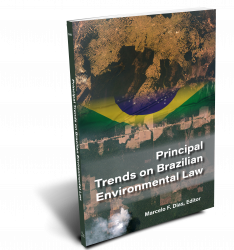
With its massive size, rich biodiversity, and unique location, Brazil plays an essential role when it comes to the health of our planet. Understanding how Brazil’s environmental laws, policies, and systems operate is therefore paramount.
With contributions from some of the most accomplished environmental lawyers of Brazil, Principal Trends on Brazilian Environmental Law is an indispensable resource for attorneys, investors, multilateral companies, nonprofits, academia, and students interested in understanding how Brazil’s environmental governance system works. Readers will learn the intricacies of Brazilian environmental governance, including laws and policies focused on water, climate, solid waste, forests, and biofuels, and gain a keen understanding of the administrative and regulatory challenges associated with the management of these resources. Throughout, the authors identify and discuss pressing Brazilian environmental issues and suggest workable solutions for many of the challenging ecological problems faced by the country, and the world, today.